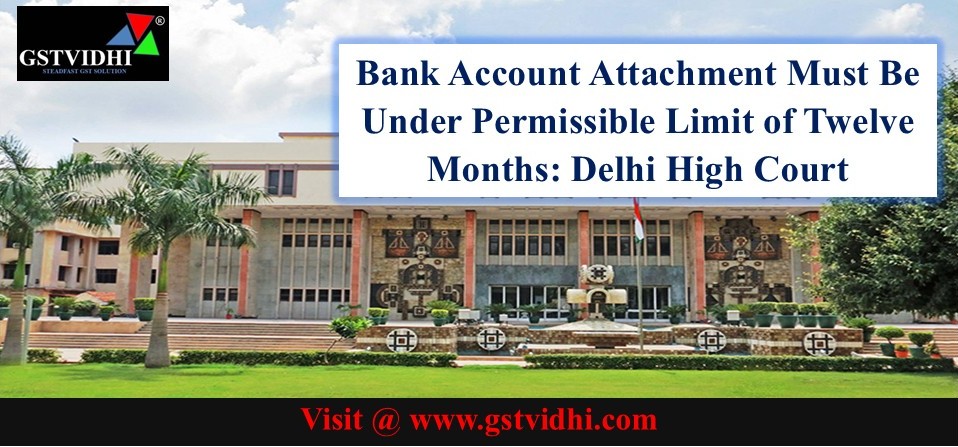
Bank Account Attachment Must Be Under Permissible Limit of
Twelve Months: Delhi HC Quashes Expired GST Provisional Attachment in Akash
Traders Case
Summary of
the Case
In a significant ruling
reinforcing statutory limitations on provisional attachments under GST law, the
Delhi High Court quashed the attachment of the bank account of Akash
Traders, which had been continued beyond the permissible period of twelve
months as prescribed under Section 83 of the Central Goods and Services
Tax Act, 2017.
The Court found that the
original attachment order dated 05 January 2022, and a subsequent
attachment order dated 18 October 2023, had both outlived their
statutory validity. Holding that such attachments cannot remain in force
indefinitely, the High Court directed the concerned financial institution to
act accordingly and declared both orders legally non-existent as of the
date of judgment.
This case reiterates that
tax authorities must adhere strictly to statutory timelines, and taxpayers’
rights cannot be curtailed through outdated coercive measures.
Case
Details
- Case Title:
Akash Traders vs. Commissioner CGST and CX Delhi & Anr.
- Case Number:
W.P.(C) 13556/2023
- Date of Order:
11 February 2025
- Court:
High Court of Delhi at New Delhi
Factual
Background
1. Initial
Attachment Order – 05 January 2022
o The
Commissioner of CGST issued an order provisionally attaching the bank
account of Akash Traders under Section 83 of the CGST Act, citing
the need to protect revenue interests during the pendency of proceedings.
o The
power under Section 83 permits attachment only during the pendency of
specified proceedings, and the order is valid for twelve months from
the date of issuance.
2. Fresh
Attachment Order – 18 October 2023
o While
the original attachment had already lapsed, a fresh provisional attachment was
again issued on 18 October 2023, also purportedly under Section 83 of the CGST
Act.
o Akash
Traders challenged this repeated freezing of its bank account before the Delhi
High Court by filing W.P.(C) 13556/2023.
3. Grounds
of Challenge
o The
petitioner contended that:
§ The
initial and subsequent attachment orders exceeded the 12-month validity
period.
§ There
was no subsisting legal order authorizing the continued freeze of their
bank account.
§ The
attachment had become illegal and unenforceable by operation of law.
§ Such
actions violated their right to carry on business, guaranteed under
Article 19(1)(g) of the Constitution.
Legal
Framework – Section 83 of CGST Act
Section 83 of the CGST
Act, 2017 empowers the Commissioner to provisionally attach
property, including bank accounts, during the pendency of certain proceedings.
Key Points:
- The power can be exercised only
during pendency of proceedings under sections like 62, 63, 64, 67, 73,
or 74.
- The attachment order remains valid
for 12 months from the date of issuance.
- The purpose is preventive, not
punitive.
- The provision must be strictly
construed, as it infringes upon the fundamental right to trade.
Submissions
by the Petitioner
The petitioner, Akash
Traders, through its counsel made the following key arguments:
- The first attachment order dated 05
January 2022 expired on 04 January 2023.
- The second order dated 18 October
2023 also ceased to exist by the time of hearing, due to lapse of
one year or absence of valid grounds.
- The department failed to show any fresh
proceedings or justification that would enable continued attachment.
- There was no explanation as to why
and under which proceedings the repeated attachments were issued.
- The continuation of these orders crippled
the petitioner’s business operations and amounted to abuse of
statutory power.
Submissions
by the Respondent
The GST Department’s
representative, while defending the attachment, made the following submissions:
- The orders were issued in good
faith, to prevent evasion of tax.
- The respondent argued that fresh
proceedings were underway, thus justifying the second order.
- However, there was no concrete
reply or document showing that the attachment was revalidated under a
new provision or with fresh satisfaction recorded under Section 83.
The respondent did not
dispute the expiry of the statutory period under Section 83, nor did
they claim that the orders had been judicially extended.
Observations
and Judgment of the Court
1. Twelve-Month Time
Limit is Mandatory
The High Court reaffirmed
that any order under Section 83 is valid only for 12 months and cannot
continue beyond that period unless reissued with due procedure.
“An order of provisional
attachment made under Section 83 of the Act would be operative only for twelve
months.”
2. Expired Orders Cannot
Be Enforced
The Court declared that
both the 05 January 2022 and 18 October 2023 orders were no
longer valid in law.
“Neither the order of 05
January 2022 nor 18 October 2023 subsist in law today.”
3. Direction to Financial
Institutions
The Court instructed the
concerned bank or financial institution to unfreeze the account forthwith,
subject to any other legal impediments.
“The concerned financial
institution [is] to proceed in light of the above… subject to there being no
other legal impediment.”
4. Disposal of Writ
Petition
Since the petitioner
obtained effective relief through the declaration of invalidity, the writ
petition was disposed of.
“The writ petition shall
stand disposed of on the above terms.”
Conclusion
The judgment in Akash
Traders vs. Commissioner CGST and CX Delhi is an essential precedent that
protects the rights of taxpayers from arbitrary coercive measures. It serves as
a reminder to tax authorities that their powers under GST are subject to
judicial oversight and temporal limitations.
While revenue protection
is important, it must be balanced against business continuity and legal
certainty. Courts will not tolerate procedural violations disguised as
administrative safeguards.
Disclaimer: All the Information is based on the notification, circular and order issued by the Govt. authority and judgement delivered by the court or the authority information is strictly for educational purposes and on the basis of our best understanding of laws & not binding on anyone.
Find the Attachment (Press on Click Here )
Click here